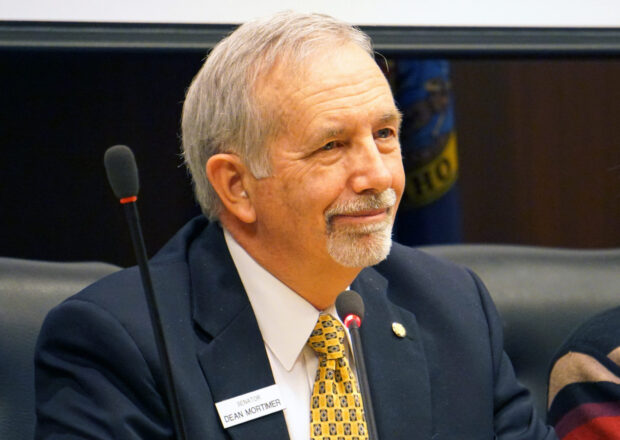After five months of work and 28 meetings, Gov. Brad Little’s K-12 education task force voted Monday to approve five recommendations that touch on topics from increasing teacher pay to all-day kindergarten.
“We’re pleased with the recommendations that have come out,” task force member and Idaho Education Association President Kari Overall said. “Obviously we have been talking about educator pay for veteran teachers for a long time and we know early childhood education has long been an issue in this state. We are excited to see those recommendations move forward so we can help students earlier be prepared for success in the state. And we know in order to retain educators we have to pay them more.”
But the task force’s Republican legislators voted against the recommendations or abstained from voting, raising questions about how the proposals might be received if they reach the Legislature.
Ultimately, a majority of members voted to approve all five of the preliminary recommendations that the “Our Kids, Idaho’s Future” task force decide to prioritize back on Oct. 1.
Using the task force’s language, the recommendations are:
- Statewide accountability focusing on K-3 literacy.
- Greater all-day kindergarten opportunities to support K-3 literacy and future student achievement.
- Building out and updating the career ladder salary allocation program to elevate the profession and retain effective educators.
- Addressing social and emotional issues to support student learning.
- Strategic alignment and increased flexibility in the K-12 funding formula.
The votes mean committee members agreed to send recommendations to Little. When he created the task force May 15, Little asked the members to help him map out a five-year plan for education, focused on early literacy and college and career readiness.
“The governor’s vision in bringing together 26 different perspectives representing different components from stakeholders and industry was to try to fashion a set of recommendations that were actionable and provided a blueprint for moving forward for the next five years in education, just like first K-12 task force,” said Greg Wilson, Little’s education adviser. “I think we did that.”
Task force co-chair Bill Gilbert believes the task force succeeded for at least three reasons.
- Education, business and political leaders came together at the table to issue recommendations that now have buy-in.
- The task force’s process and meetings brought to light best practices and bright spots in education throughout Idaho, including the Bruneau-Grand View School District’s no-excuses turnaround plan or Boise rethinking its approach to literacy.
- By backing a new accountability plan based on achievement in literacy, the state is undertaking an important conversation about changing the culture in education.
“I’m very, very pleased with where we are at,” Gilbert said.
Superintendent of Public Instruction Sherri Ybarra, in particular, offered vocal support for the recommendation focusing on students’ social and emotional well-being.
“This has to come first or nothing else is going to come with it,” Ybarra said. ”Achievement is secondary to social-emotional learning.”
But the 26-member task force’s votes were not unanimous.
The six Republican legislators on the task force either abstained from voting or voted against some specific recommendations. Senate Education Committee Chairman Dean Mortimer and House Education Committee Chairman Lance Clow, R-Twin Falls, abstained from all votes Monday. Rep. Gary Marshall, R-Idaho Falls, voted against the all-day kindergarten recommendation and abstained from voting on the budget flexibility recommendation. Rep. Wendy Horman, the Idaho Falls Republican who serves as vice chair of the powerful Joint Finance-Appropriations Committee, voted against building out the career ladder, against the funding flexibility recommendation and against all-day kindergarten. Senate Majority Leader Chuck Winder, R-Boise, abstained from voting on the kindergarten recommendation. House Assistant Majority Leader Jason Monks, R-Nampa, either voted against or abstained from voting on four recommendations.

The GOP legislators did more than just abstain. For 90 minutes before lunch, they took turns pushing back against recommendations to build out the career ladder, offer optional, all-day kindergarten and implement a new accountability model.
Mortimer and Marshall both said it’s not clear all-day kindergarten would be effective or what Idahoans want.
The career ladder salary plan has succeeded in increasing pay for beginning teachers, Mortimer said, but has been unsuccessful in other ways, because there is “funding that was intended for a certain class of teachers that is going to a different class.”
“To say we want to put a third rung on the career ladder, I don’t think that’s necessarily where we want to go,” Mortimer said. “I think we’ve missed the mark on this one.”
Each recommendation — aside from the literacy-based accountability plan — was developed by the educators, business leaders, state officials who sat on subcommittees this summer. Then the full task force voted on Oct. 1 to narrow a list of 11 preliminary recommendations down to five. Thousands of collective hours of labor went into those meetings and developing those recommendations, Gilbert said. Task force member and St. Maries school trustee Jody Hendrickx, for instance, said he will have put 10,000 miles on his car just traveling to task force and subcommittee meetings.
Because there was little to no public pushback to any recommendation during the task force’s five months of work, Monday’s 11th-hour dissent appeared to surprise other task force members.
After the vote, Clow explained his decision to abstain.
“I felt like if I were to vote in favor or against any or all of the recommendations, it would be putting me as a chairman, who needs to be somewhat of a fair and balanced moderator, in a position like someone might say ‘you’re doing this because you voted in favor already, we already know your position,’” Clow told Idaho Education News. “Remaining neutral on the vote was important for proper leadership of the committee.”
On the other hand, the Republican Ybarra, the task force’s Democratic legislators, and all of the group’s education stakeholders and business leaders supported each of the recommendations.
Bluum CEO Terry Ryan abstained from voting on building out the career ladder.

State Board of Education President Debbie Critchfield, who serves as the other task force co-chair, thinks budgetary implications might explain some legislators’ reluctance to support some recommendations outright.
“Bill and Greg and I, we are no different than our legislative partners in that we recognize there are budget implications and we are not sure of what those would be or are yet,” Critchfield said. “I assume was a lot of the feeling with why they didn’t cast a vote.”
After the meeting, Ybarra praised the task force’s process and said she will help Little move the recommendations forward.
“I loved hearing all the perspectives from all the different folks in the room,” she said. “I look forward to implementing and hearing what the governor has to say about the recommendations when they come across his desk.”
Disclosure: Idaho Education News and Bluum are both funded by grants from the J.A. and Kathryn Albertson Family Foundation.
